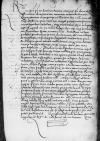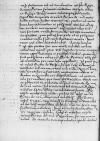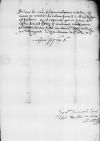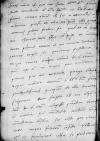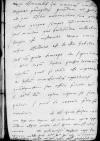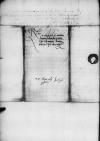Quem animum in me perspicio Reverendissimae Dominationis Vestrae, non est mihi dubium, quin suis non magis quam meis fortunarum accessionibus laetetur neque mediocrem ex eo voluptatem capiat, quod sacra ⌊maiestas regia⌋, Deo cor eius inclinante, me Plocensem episcopum renuntiavit. Modo Deus vitam praestet incolumem et eam diuturnam, est iam illius benignitate, unde me pro dignitate sustentare queam. De reliquo, quod volent, constituant, neque enim desunt variae machinationes, mihi tamen sors haec mea non displicet.
⌊Theodorici de Rheden⌋ nomine nihil hic est, quod quidem ego sciam actum per quemquam. Si quid erit, dabitur a me opera, prius ut ad Vestram Reverendissimam Dominationem referatur, quam hic aliquae litterae concedantur. Cum ⌊palatino Culmensi⌋ expostulat per litteras sacra ⌊maiestas regia⌋, cum propter edictorum contemptum, tum propter caedes, quae in territorio eius fieri dicuntur. Quas litteras et earum una exemplum Reverendissimae Dominationi Vestrae mitto.
De domino ⌊Holstein⌋ aliud fieri non potuit, quam quod factum est. Abhorrebat altera pars a concordia neque visum est sacrae ⌊maiestati regiae⌋ eam cogere. Porro in ea causa, quam habet cum ⌊Gedanensi senatu⌋, obtinuit a me omnia, quae postulavit. Scripsi praeterea litteras ad ⌊senatum⌋, singillatim etiam ad dominum ⌊Ioannem Stutte⌋, ⌊Ioannem Werden⌋, ⌊Georgium Schewka⌋. Quarum exempla mitto Reverendissimae Dominationi Vestrae et erit arbitrii written over o⌈oii written over o⌉ illius iubere illas reddi aut non reddi. Cum potente negat sapiens litigandum. Vellem, si fieri posset, citra lites negotium hoc componi. Qua in re mea opera Reverendissimae Dominationi Vestrae defutura non est, si quid modo profici hac ratione posse putaverit.
⌊Gnapheum⌋ sicubi dudum aperuisse cognoverit Reverendissima Dominatio Vestra, faciet me certiorem. Curae  BCz, 1599, p. 2 mihi futurum est, ut scribantur edicta regia.
BCz, 1599, p. 2 mihi futurum est, ut scribantur edicta regia.
⌊Domino reverendissimo Culmensi⌋ mittitur scripta denuo et ⌊regiae maiestatis⌋ manu subscripta declaratio. Quod me scripsisse scribit Reverendissima Dominatio Vestra modos bona ratione fultos inventos iri, quibus ad contribuendum inducantur in proximis ⌊comitiis⌋, id ego me scribere non memini neque modos ullos scio, nisi fortasse Vestram Reverendissimam Dominationem eos esse inventuram, scripsissem, quin potius fore puto, ut in proximis comitiis nulla fiat contributionis mentio, quod unus aut alter dies indicabit.
⌊Bartholomeus Vogt⌋ ipse quidem huc non venit, sed civi cuidam iura sua misit, quae etsi legenda curavi, non prius tamen appellationem ei prosequi licebit, quam idem suis quoque licere voluerit
ill(ustris) or ill(ustrissimus)⌈ill(ustris)ill(ustris) or ill(ustrissimus)⌉
dominus ⌊Prussiae dux⌋, ut ab sententia per eum lata appellent. Ad quem ita, ut voluit Reverendissima Dominatio Vestra, scripsi litteras de bonis ab intestato, sed earum usum non video. Nam si bona ista hereditaria fuerunt, nequaquam cadere videntur in loci ordinarii dispositionem, ad quem ea sola perveniunt, quae sunt ecclesiastica. Deinde vero, an habuerit sacerdotium aliquod in ⌊diocesi⌋ Reverendissimae Dominationis Vestrae, nescio, sed si mortuus est in ⌊Monte Regio⌋, videtur extra illius iurisdictionem fuisse. Ego nihilominus litteras mitto, quibus uti velit nec ne Reverendissima Dominatio Vestra, illius erit arbitrii.
Ill(ustri) or Ill(ustrissimo)⌈Ill(ustri)Ill(ustri) or Ill(ustrissimo)⌉
⌊domino duci⌋ nihil scripsi neque enim ex eo tempore in suis ullis ad me litteris mentionem aliquam eius rei fecit, neque facturum arbitror. Itaque silentio transactum iri negotium confido. Quod si videtur nihilominus Reverendissimae Dominationi Vestrae, ut scribam, faciam non invitus.
De moneta non improbatur quidem consilium  BCz, 1599, p. 3 Reverendissimae Dominationis Vestrae, sed periculo written over u⌈uoo written over u⌉sum videtur. Quod tamen in ⌊comitiis⌋ decretum fuerit, sacra ⌊maiestas regia⌋ est factura.
BCz, 1599, p. 3 Reverendissimae Dominationis Vestrae, sed periculo written over u⌈uoo written over u⌉sum videtur. Quod tamen in ⌊comitiis⌋ decretum fuerit, sacra ⌊maiestas regia⌋ est factura.
Quod superest, opto, ut Reverendissima Dominatio Vestra diu sit felix et incolumis. Cuius amori et benevolentiae fraternae me commendo.
Satis edocta est per me sacra ⌊maiestas regia⌋, quanto studio contenderit Dominatio Vestra Reverendissima, ut contributio fieret, verum aliud illi hic a nonnullis inculcatur, quasi non alia re, quam odio quodam nominis Poloni factum sit, quod ea non successerit, usque eo fieri isthic non posse, ut minimum terrae Polonus etiam is, qui nomine tantum Polonus, re ipsa sit Prutenus, possideat. Neque vacare culpa volunt Reverendissimam Dominationem Vestram, quam ego tamen non magis pro amicitia, quam pro rei veritate purgo diligenter hidden by binding⌈[r]r hidden by binding⌉, neque inducit animum sacra ⌊maiestas regia⌋, princeps prudentissimus, quicquam de illa temere suspicari.
Quae scripsit ad me aliis in litteris Reverendissima Dominatio Vestra dixisse quendam, deinceps hidden by binding⌈[ps]ps hidden by binding⌉(?) non rogabit, sed mandabit. Tendunt iam huc hidden by binding⌈[uc]uc hidden by binding⌉(?) nonnullorum consilia, sed obsto pro virili mea neque futurum confido. Vellem tamen, ut faciliores isthic se praeberent.  BCz, 1599, p. 5 Nequit obfirmatus hic animus multum. Displicet principibus. Parcendum est temporibus, ad quae consilia accomodare sua pruden hidden by binding⌈[en]en hidden by binding⌉tissimi quique semper consueverunt. Ad ⌊comitia⌋, quae habebuntur, nulla dum scripta est instructio neque enim adhuc consultatio est de illis habita, sed non puto deinceps ita supplicaturam sacram ⌊maiestatem regiam⌋. Agitur ⌊Prussiae⌋ terrarum negotium, quas si volunt esse imparatas, ut hostium incursionibus opportunas, quandoquidem suo officio functa est sacra ⌊maiestas regia⌋ extra culpam se fore putat, si quid de repente praeter spem acciderit.
BCz, 1599, p. 5 Nequit obfirmatus hic animus multum. Displicet principibus. Parcendum est temporibus, ad quae consilia accomodare sua pruden hidden by binding⌈[en]en hidden by binding⌉tissimi quique semper consueverunt. Ad ⌊comitia⌋, quae habebuntur, nulla dum scripta est instructio neque enim adhuc consultatio est de illis habita, sed non puto deinceps ita supplicaturam sacram ⌊maiestatem regiam⌋. Agitur ⌊Prussiae⌋ terrarum negotium, quas si volunt esse imparatas, ut hostium incursionibus opportunas, quandoquidem suo officio functa est sacra ⌊maiestas regia⌋ extra culpam se fore putat, si quid de repente praeter spem acciderit.
De domino ⌊Czema⌋ frustra ago cum ⌊rege⌋, cum ⌊regina⌋ est incommodum agere. Exspectandum adhuc censeo domino ⌊Czeme⌋, dum sol alius oriatur.
De ⌊Gedanensium⌋ neglectu erga processionem moleste fert ⌊maiestas regia⌋, sed usque ad ⌊conventum⌋ dissimulare vult, ad quem nescio, utrum proficiscetur.
 BCz, 1599, p. 2 mihi futurum est, ut scribantur edicta regia.
BCz, 1599, p. 2 mihi futurum est, ut scribantur edicta regia. BCz, 1599, p. 3 Reverendissimae Dominationis Vestrae, sed periculo written over u⌈uoo written over u⌉sum videtur. Quod tamen in
BCz, 1599, p. 3 Reverendissimae Dominationis Vestrae, sed periculo written over u⌈uoo written over u⌉sum videtur. Quod tamen in  BCz, 1599, p. 5 Nequit obfirmatus hic animus multum. Displicet principibus. Parcendum est temporibus, ad quae consilia accomodare sua pruden hidden by binding⌈[en]en hidden by binding⌉tissimi quique semper consueverunt. Ad
BCz, 1599, p. 5 Nequit obfirmatus hic animus multum. Displicet principibus. Parcendum est temporibus, ad quae consilia accomodare sua pruden hidden by binding⌈[en]en hidden by binding⌉tissimi quique semper consueverunt. Ad 